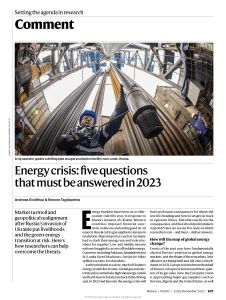Acesse a sua conta getAbstract para obter o resumo!

Acesse a sua conta getAbstract para obter o resumo!
Andreas Goldthau and Simone Tagliapietra
Energy crisis: five questions that must be answered in 2023
Market turmoil and geopolitical realignment after Russia’s invasion of Ukraine put livelihoods and the green-energy transition at risk. Here’s how researchers can help overcome the threats.
Nature, 2022
Sobre o que é?
Researchers seek ways to stabilize the global transition to green energy, despite societal conflicts.
Recommendation
The global energy crisis threatens populations around the world. Russia’s Ukraine invasion prompted embargoes on Russian oil exports to European countries. Some cut energy usage and search for alternatives, while lower-income nations such as Bangladesh and Pakistan suffer blackouts and increased food prices. Energy prices remain high, while countries rich in fossil fuels call the shots. In this comprehensive overview, researchers discuss how to mitigate the crisis, and create a green energy future for everyone.
Summary
About the Authors
Andreas Goldthau is a professor at the Willy Brandt School of Public Policy at the University of Erfurt, Germany. He is the research group lead at the Institute for Advanced Sustainability Studies in Germany. Simone Tagliapietra is a senior fellow at the think tank Bruegel in Belgium. He is a professor of energy, climate and environmental policy at the Catholic University of Sacred Heart in Italy.






















Comment on this summary